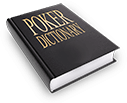Understanding Blinds
One question that often comes in our minds is that why don't players just fold until they get pocket aces? Well, this is prevented by forcing each player to pay a "tax" on the hands he plays. This tax comes in the form of blind bets, commonly called blinds. Each hand, one player at the table puts in a big blind (BB), and the player in front of him puts in a small blind (SB). In most poker games, the small blind is half the size of the big blind. The big blind is usually the size of a small bet in a limit game.
For example, in a 20 / 80 game:
Small Blind: 1
Big Blind: 2
Small Bet: 2 (preflop and flop)
Big Bet: 4 (turn and river)
The blinds are paid regardless of whether the player likes his cards or not. The other players must call (or raise) the blind bet, or else they must fold. The player in the small blind must make up the difference between the BB and SB in order to stay in the hand. So if the big blind was 2 and the small blind was 1, the player in the small blind would have to pay 1 to call.
An important thing to keep in mind is that you shouldn’t defend your blinds too often. You should only defend the blinds when you have a good or at least a moderate hand. Selecting the hand with which to defend is really very important. Never defend with the hands that are most likely to be dominated. You can opt for sequential middle cards or pairs. Defending your blinds in a limit game is a little easier due to better pot odds but that doesn’t guarantee your win. Moreover, defending your blind does not mean calling. Attacking is the best form of defence so it is advisable to defend with a raise.
